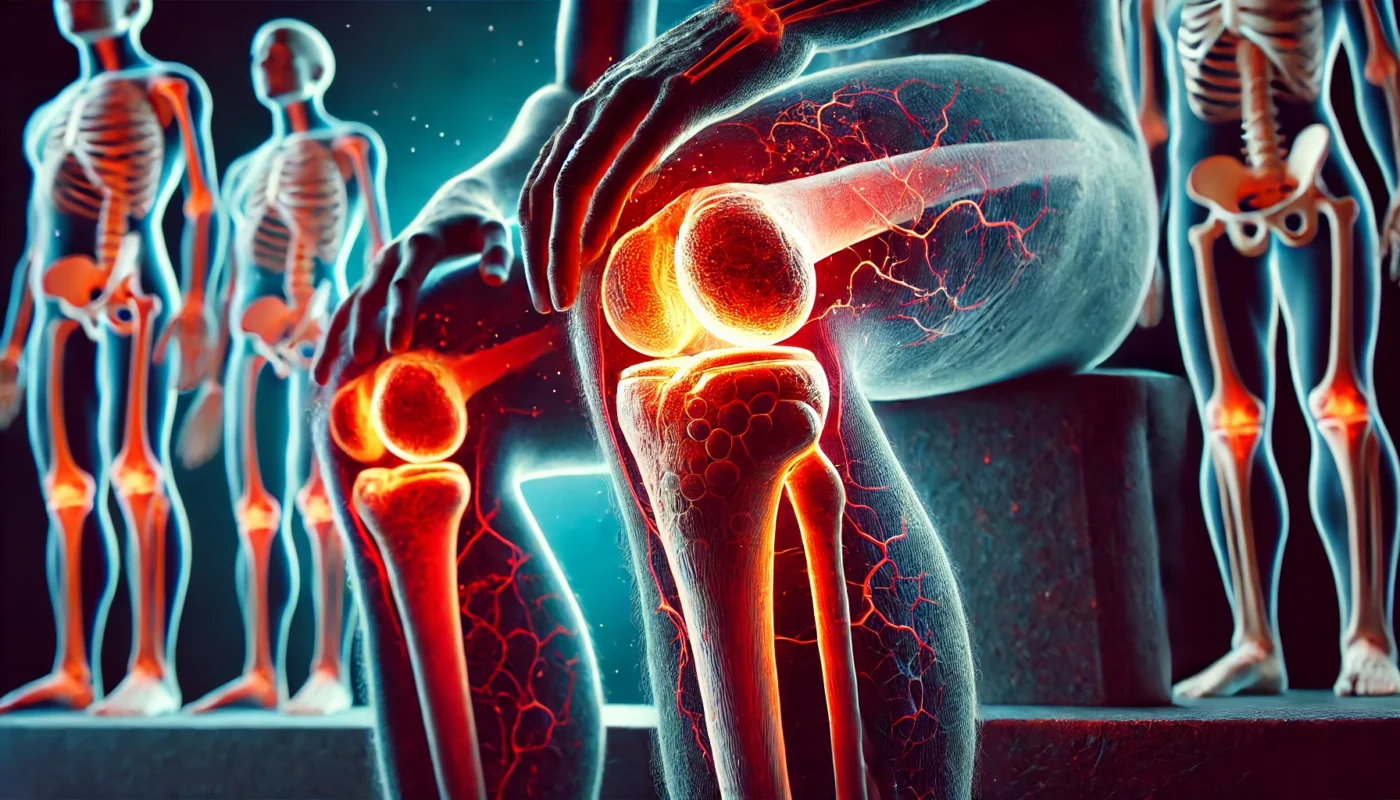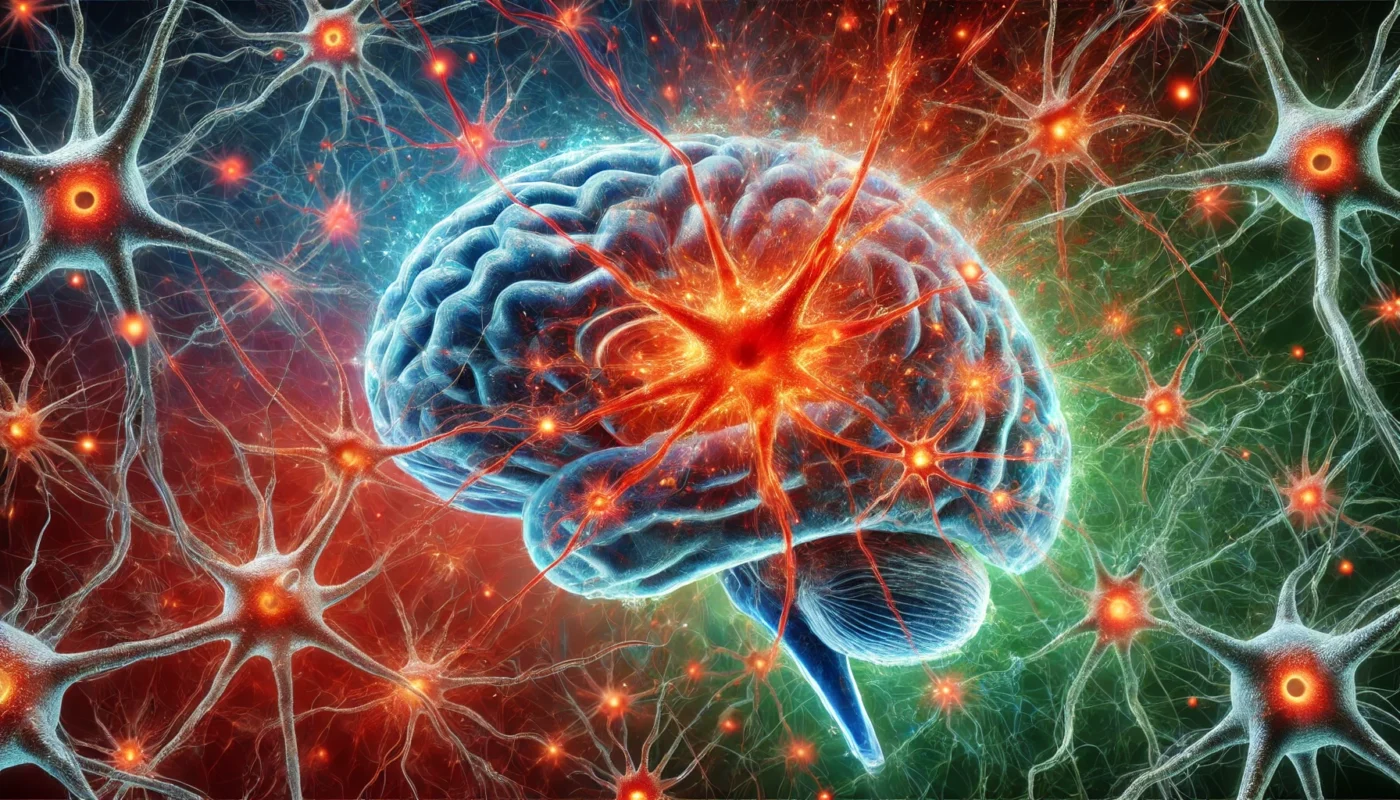Chronic inflammation: a term that might sound slightly intimidating, and rightfully so. It’s a silent aggressor lurking within the body, often going unnoticed until it manifests as something more severe. In this article, we’ll delve into the intricacies of chronic inflammation, exploring why inflammation can be detrimental to your health and how to manage it effectively.
You may also like: 20 Powerful Anti-Inflammatory Foods
What is Inflammation?
To comprehend why inflammation can be harmful, it’s essential first to understand what it is. Inflammation is a biological response triggered by the immune system to protect the body from harm. When you get a cut or an infection, inflammation works to heal the wound and fend off pathogens. This acute inflammation is generally beneficial and necessary for survival.
Acute Inflammation: A Protective Response
Acute inflammation is the body’s immediate reaction to injury or infection. This process involves the immune system dispatching white blood cells to the affected area, resulting in redness, warmth, swelling, and pain. These symptoms, while uncomfortable, signify that the body is actively working to repair and protect itself. Without acute inflammation, wounds could become infected, and healing would be significantly impaired.
Transition from Acute to Chronic Inflammation
The transition from acute to chronic inflammation is a critical point in understanding its potential harm. When the body’s inflammatory response does not resolve appropriately, it can become chronic. This prolonged inflammation may occur due to persistent infections, exposure to irritants, or autoimmune disorders. In chronic inflammation, the body remains in a state of alert, continuously damaging its tissues and organs over time.
Mechanisms Behind Chronic Inflammation
Chronic inflammation involves complex interactions between the immune system and various cells and molecules. This ongoing inflammatory process can alter normal cellular functions and lead to tissue damage. Cytokines and chemokines, signaling molecules produced by immune cells, play a central role in perpetuating inflammation. Understanding these mechanisms is crucial for developing effective treatments and interventions.
Why is Inflammation Bad?
Chronic inflammation is akin to a slow-burning fire, causing gradual damage to the body. Here’s why it’s concerning:
It Fuels Chronic Diseases
Chronic inflammation is linked to a plethora of diseases, including heart disease, diabetes, cancer, and Alzheimer’s. The continuous inflammatory response can damage cells, tissues, and organs, creating an environment conducive to disease development.
Heart Disease and Inflammation
Inflammation is a key player in the development of atherosclerosis, a condition characterized by the buildup of fatty deposits in the arteries. This buildup can lead to heart attacks or strokes. Inflammatory markers such as C-reactive protein (CRP) are often elevated in individuals with cardiovascular disease, highlighting the connection between inflammation and heart health.
Diabetes and Metabolic Disorders
Inflammation is closely associated with insulin resistance, a hallmark of type 2 diabetes. Adipose tissue, particularly in obese individuals, can produce inflammatory cytokines that interfere with insulin signaling. This inflammatory state exacerbates metabolic disorders, increasing the risk of developing diabetes and its complications.
Cancer and Inflammatory Pathways
Chronic inflammation can contribute to the initiation and progression of cancer. Inflammatory cells and cytokines can promote tumor growth, survival, and metastasis. The persistent inflammatory environment can damage DNA, leading to genetic mutations that drive cancer development. Understanding the link between inflammation and cancer opens avenues for targeted therapies and prevention strategies.
It Impacts Longevity
Can you die from inflammation? While inflammation itself may not be the direct cause of death, the conditions it precipitates can be life-threatening. Chronic inflammation accelerates the aging process at the cellular level, contributing to age-related diseases and potentially reducing lifespan.
Aging and Cellular Senescence
Chronic inflammation is intricately linked to the aging process, often referred to as “inflammaging.” This phenomenon describes the low-grade, chronic inflammation that occurs with age, contributing to cellular senescence and tissue dysfunction. Senescent cells release inflammatory molecules that further perpetuate inflammation, creating a vicious cycle that accelerates aging.
Inflammatory Markers as Predictors of Longevity
Studies have shown that elevated levels of inflammatory markers, such as interleukin-6 (IL-6) and tumor necrosis factor-alpha (TNF-α), are associated with a higher risk of mortality in older adults. Monitoring these markers can provide insights into an individual’s inflammatory status and potential health risks, emphasizing the importance of managing inflammation for longevity.
Strategies to Promote Healthy Aging
Addressing chronic inflammation is crucial for promoting healthy aging and extending lifespan. Lifestyle interventions, such as a balanced diet, regular exercise, and stress reduction, play a significant role in mitigating inflammation. Additionally, research into anti-inflammatory compounds and therapies offers promise for enhancing longevity and quality of life.
It Affects Mental Health
Chronic inflammation is not confined to physical health; it also impacts mental well-being. Studies suggest a correlation between inflammation and mental health disorders such as depression and anxiety. The inflammatory markers can influence neurotransmitter pathways, affecting mood and behavior.
The Gut-Brain Axis and Inflammation
The gut-brain axis, a bidirectional communication system between the gut and the brain, plays a crucial role in mental health. Inflammation in the gut can impact the production of neurotransmitters like serotonin, affecting mood and cognitive function. Maintaining a healthy gut microbiome through diet and probiotics can help modulate inflammation and support mental well-being.
Inflammation and Neurotransmitter Imbalance
Inflammation can disrupt the balance of neurotransmitters, chemicals that regulate mood and behavior. Pro-inflammatory cytokines can decrease the availability of serotonin, dopamine, and norepinephrine, contributing to symptoms of depression and anxiety. Understanding this connection highlights the potential of anti-inflammatory treatments for improving mental health outcomes.
Addressing Inflammation for Better Mental Health
Addressing chronic inflammation is a promising avenue for improving mental health. Integrating anti-inflammatory strategies, such as dietary changes, physical activity, and stress reduction, can have a positive impact on mood disorders. Collaborating with healthcare professionals to explore personalized approaches can further enhance mental well-being.
Causes of Chronic Inflammation
Identifying the root causes of chronic inflammation is crucial for prevention and management. Some common culprits include:
Poor Diet
A diet high in processed foods, sugar, and trans fats can trigger inflammation. Conversely, a diet rich in fruits, vegetables, whole grains, and healthy fats can help reduce it.

The Role of Processed Foods
Processed foods often contain additives, preservatives, and unhealthy fats that can trigger inflammation. These foods are low in essential nutrients and fiber, contributing to an imbalanced diet that promotes inflammation. Reducing consumption of processed foods and opting for whole, nutrient-dense options can significantly impact inflammation levels.
Sugar and Inflammatory Response
Excessive sugar intake is linked to increased inflammation. High sugar levels can lead to the production of advanced glycation end products (AGEs), which promote inflammation and oxidative stress. Replacing sugary snacks with natural sweeteners and whole fruits can help reduce inflammation and support overall health.
Anti-Inflammatory Nutrients
Certain nutrients have potent anti-inflammatory properties. Omega-3 fatty acids, found in fatty fish and flaxseeds, can reduce inflammation and improve heart health. Antioxidants from colorful fruits and vegetables neutralize free radicals, mitigating inflammation. Incorporating these nutrients into your diet can be a powerful tool for managing chronic inflammation.
Sedentary Lifestyle
Lack of physical activity contributes to weight gain and metabolic disturbances, both of which can exacerbate inflammation.
The Impact of Physical Inactivity
A sedentary lifestyle is associated with higher levels of inflammatory markers. Physical inactivity leads to weight gain, insulin resistance, and increased visceral fat, all of which contribute to chronic inflammation. Regular physical activity can counteract these effects, promoting a healthier inflammatory profile.
Exercise as an Anti-Inflammatory Strategy
Exercise has numerous benefits for reducing inflammation. It promotes the release of anti-inflammatory cytokines and improves immune function. Engaging in a combination of aerobic exercises, strength training, and flexibility exercises can optimize inflammation management and overall health.
Overcoming Barriers to Physical Activity
Many people face challenges in maintaining a consistent exercise routine. Identifying barriers such as time constraints, lack of motivation, or limited access to facilities is the first step in overcoming them. Setting realistic goals, finding enjoyable activities, and seeking social support can enhance adherence to an active lifestyle.
Stress
Chronic stress has been shown to elevate inflammatory markers. Stress management techniques such as meditation and yoga can be beneficial in reducing inflammation.
The Physiology of Stress-Induced Inflammation
Stress triggers the release of cortisol, a hormone that, when elevated chronically, can promote inflammation. The hypothalamic-pituitary-adrenal (HPA) axis plays a key role in this response, influencing immune function and inflammatory processes. Understanding the physiological mechanisms of stress-induced inflammation can guide effective management strategies.
Mindfulness and Stress Reduction
Mindfulness practices, such as meditation and deep breathing, can reduce stress and inflammation. These techniques promote relaxation and enhance emotional regulation, mitigating the impact of stress on the body. Incorporating mindfulness into daily routines can be a powerful tool for managing chronic inflammation.
Building Resilience to Stress
Developing resilience to stress involves adopting strategies to cope with life’s challenges effectively. Engaging in activities that promote relaxation, maintaining social connections, and fostering a positive mindset can enhance resilience. By building resilience, individuals can reduce stress-related inflammation and improve overall well-being.
Environmental Toxins
Exposure to pollutants and toxins in the environment can also instigate an inflammatory response. Reducing exposure and detoxifying can be part of an inflammation-reducing strategy.
Common Environmental Toxins
Environmental toxins, such as air pollutants, heavy metals, and pesticides, can contribute to inflammation. These substances can be found in the air we breathe, the food we eat, and the products we use daily. Identifying and minimizing exposure to these toxins is essential for reducing their impact on inflammation.
Detoxification and Inflammation
Detoxification processes in the body help eliminate toxins and reduce inflammation. Supporting the liver and kidneys, the primary detoxification organs, through proper nutrition and hydration is crucial. Incorporating detoxifying foods like cruciferous vegetables and staying hydrated can enhance the body’s ability to manage toxins and inflammation.
Creating a Low-Toxin Environment
Creating a low-toxin environment involves making conscious choices about the products and materials used in daily life. Opting for natural, non-toxic cleaning products, reducing plastic use, and improving indoor air quality are effective steps. These changes can significantly reduce exposure to environmental toxins and support inflammation management.
Strategies to Combat Chronic Inflammation
Taking a holistic approach to managing inflammation can yield significant benefits. Here are some practical strategies:
Adopt an Anti-Inflammatory Diet
Incorporate foods rich in omega-3 fatty acids, antioxidants, and phytochemicals. Think fatty fish, nuts, leafy greens, and colorful fruits.
Omega-3 Fatty Acids and Inflammation
Omega-3 fatty acids, found in fish like salmon and mackerel, have potent anti-inflammatory effects. These healthy fats can reduce the production of inflammatory cytokines and improve heart health. Including omega-3-rich foods in your diet is a cornerstone of an anti-inflammatory eating plan.
The Power of Antioxidants
Antioxidants neutralize free radicals, reducing oxidative stress and inflammation. Berries, dark chocolate, and green tea are rich sources of antioxidants. Consuming a variety of antioxidant-rich foods can protect cells from damage and support overall health.
Phytochemicals and Inflammation
Phytochemicals are bioactive compounds found in plants that have anti-inflammatory properties. Flavonoids, carotenoids, and polyphenols are examples of phytochemicals that can modulate inflammation. Incorporating a diverse range of colorful fruits and vegetables into your diet ensures a robust intake of these beneficial compounds.
Exercise Regularly
Engaging in regular physical activity helps maintain a healthy weight and reduces inflammatory markers. Aim for at least 150 minutes of moderate exercise per week.
The Role of Aerobic Exercise
Aerobic exercise, such as walking, jogging, or cycling, is particularly effective at reducing inflammation. It enhances cardiovascular fitness, supports weight management, and lowers inflammatory markers. Incorporating aerobic activities into your routine can have profound effects on inflammation and overall health.
Strength Training for Inflammation Management
Strength training exercises, such as weightlifting or resistance band workouts, contribute to muscle health and metabolic function. Building muscle mass can improve insulin sensitivity and reduce inflammation. A balanced exercise program that includes strength training is essential for comprehensive inflammation management.
Flexibility and Recovery
Flexibility exercises, such as yoga or stretching routines, improve joint mobility and reduce stiffness. These activities promote relaxation and recovery, essential components of an anti-inflammatory lifestyle. Prioritizing flexibility exercises can complement other forms of exercise and enhance overall well-being.
Prioritize Sleep
Quality sleep is essential for regulating inflammatory responses. Aim for 7-9 hours per night to help the body repair and rejuvenate.

Sleep and Inflammatory Regulation
Sleep plays a critical role in regulating the immune system and inflammation. During deep sleep, the body produces cytokines that modulate inflammation and support immune function. Consistent, restful sleep is vital for maintaining a balanced inflammatory response.
Strategies for Improving Sleep Quality
Improving sleep quality involves creating a conducive sleep environment and adopting healthy sleep habits. Establishing a regular sleep schedule, limiting screen time before bed, and ensuring a comfortable sleep environment can enhance sleep quality. These strategies promote restorative sleep, reducing inflammation and supporting overall health.
Addressing Sleep Disorders
Sleep disorders, such as insomnia or sleep apnea, can exacerbate inflammation. Seeking professional evaluation and treatment for sleep disorders is crucial for optimizing sleep quality. Collaborating with healthcare providers to address sleep issues can significantly impact inflammation management and well-being.
Manage Stress
Incorporating stress-reduction techniques such as mindfulness, deep breathing exercises, and progressive muscle relaxation can lower stress-induced inflammation.
Mindfulness Practices for Stress Reduction
Mindfulness practices, such as meditation and mindful breathing, promote relaxation and emotional regulation. These techniques can reduce stress and its impact on the body, including inflammation. Incorporating mindfulness into daily life can enhance resilience to stress and improve overall well-being.
Progressive Muscle Relaxation
Progressive muscle relaxation involves systematically tensing and relaxing muscle groups to reduce stress. This technique promotes physical and mental relaxation, lowering stress-induced inflammation. Practicing progressive muscle relaxation regularly can be an effective tool for managing chronic inflammation.
Deep Breathing Exercises
Deep breathing exercises activate the parasympathetic nervous system, promoting relaxation and reducing stress. Techniques such as diaphragmatic breathing can lower cortisol levels and decrease inflammation. Incorporating deep breathing exercises into daily routines can provide significant benefits for stress management and inflammation reduction.
Consider Supplements
Certain supplements, like turmeric (curcumin), omega-3 fish oils, and green tea extract, have anti-inflammatory properties. Always consult with a healthcare provider before starting any new supplement regimen.
Turmeric and Curcumin
Turmeric contains curcumin, a compound with powerful anti-inflammatory effects. Curcumin can inhibit inflammatory pathways and reduce oxidative stress. Including turmeric in your diet or taking curcumin supplements can be beneficial for managing chronic inflammation.
Omega-3 Fish Oils
Omega-3 fish oil supplements provide concentrated doses of anti-inflammatory fatty acids. These supplements can reduce inflammation and support heart health. Consulting with a healthcare provider can help determine the appropriate dosage and ensure safe use.
Green Tea Extract
Green tea extract contains polyphenols with anti-inflammatory and antioxidant properties. These compounds can reduce inflammation and support overall health. Incorporating green tea or its extract into your diet can be a valuable addition to an anti-inflammatory strategy.
Holistic and Alternative Approaches
Exploring alternative approaches can also offer relief from chronic inflammation:
Herbal Remedies
Herbs such as ginger, turmeric, and boswellia have been used traditionally to combat inflammation. These can be consumed as teas, capsules, or incorporated into meals.
Ginger and Inflammation
Ginger contains bioactive compounds that have anti-inflammatory and antioxidant effects. Consuming ginger as a tea or in meals can help reduce inflammation and support digestive health. Exploring ginger as a natural remedy offers potential benefits for managing chronic inflammation.
Turmeric in Traditional Medicine
Turmeric has a long history of use in traditional medicine for its anti-inflammatory properties. In addition to curcumin, turmeric contains other compounds that contribute to its health benefits. Incorporating turmeric into cooking or taking it as a supplement can be an effective strategy for reducing inflammation.
Boswellia and Joint Health
Boswellia, also known as Indian frankincense, has anti-inflammatory properties that support joint health. It can reduce inflammation and pain in conditions like arthritis. Including boswellia supplements or extracts in a holistic approach to inflammation management can enhance joint comfort and mobility.
Acupuncture
This ancient practice may help reduce inflammation by promoting blood flow and releasing natural pain-relieving chemicals in the body.
Mechanisms of Acupuncture
Acupuncture involves inserting thin needles into specific points on the body to stimulate energy flow and balance. This practice can influence the release of endorphins, reduce stress, and modulate immune responses. Understanding the mechanisms of acupuncture provides insights into its potential anti-inflammatory effects.
Benefits for Inflammation and Pain
Acupuncture has been shown to reduce inflammation and alleviate pain in various conditions. It can enhance blood circulation and promote the release of natural pain-relieving chemicals. Incorporating acupuncture into a comprehensive inflammation management plan can offer additional relief and support healing.
Integrating Acupuncture with Conventional Treatments
Acupuncture can complement conventional treatments for inflammation and pain management. Collaborating with healthcare providers to integrate acupuncture into a broader treatment plan can enhance outcomes. This holistic approach leverages the benefits of both traditional and alternative therapies.
Chiropractic Care
Some studies suggest that chiropractic adjustments can reduce inflammation and pain, contributing to overall wellness.
The Role of Chiropractic Adjustments
Chiropractic adjustments focus on aligning the spine and improving nervous system function. These adjustments can reduce inflammation and enhance joint mobility. Understanding the role of chiropractic care in inflammation management highlights its potential benefits for overall wellness.
Inflammation and Musculoskeletal Health
Chronic inflammation can contribute to musculoskeletal pain and dysfunction. Chiropractic care can address these issues by improving alignment and reducing stress on the body. Incorporating chiropractic adjustments into a holistic approach to inflammation management can support musculoskeletal health.
Collaborating with Healthcare Professionals
Integrating chiropractic care with other healthcare approaches requires collaboration with healthcare professionals. This interdisciplinary approach ensures comprehensive care and enhances the effectiveness of inflammation management strategies. Consulting with healthcare providers can guide safe and effective chiropractic care.

Conclusion
Chronic inflammation is a complex condition with far-reaching implications for health and well-being. By understanding its dangers and implementing a comprehensive, proactive approach, you can mitigate its effects and enhance your quality of life. From dietary changes and exercise to mindfulness and alternative therapies, a wide array of strategies are available to help combat this silent adversary. Remember, the path to reduced inflammation is gradual, requiring consistency and patience. As you embark on this journey, prioritize listening to your body and seeking professional guidance when needed.
By incorporating these strategies into your lifestyle, you can effectively manage inflammation and protect your health for the long term. Through a combination of conventional and alternative approaches, it is possible to address the root causes of chronic inflammation and support overall wellness. Embracing a holistic perspective empowers individuals to take control of their health and foster a balanced, inflammation-free life.
Further Reading:
Chronic inflammation: What it is, why it’s bad, and how you can reduce it
What is inflammation, and why is it dangerous?
Flexibility exercises, sleep quality, inflammation management, stress reduction, mindfulness, turmeric, omega-3 fish oils, green tea extract, herbal remedies, acupuncture, chiropractic care, holistic health, anti-inflammatory lifestyle, joint health, chronic inflammation, wellness strategies
Important Note: The information contained in this article is for general informational purposes only, and should not be construed as health or medical advice, nor is it intended to diagnose, prevent, treat, or cure any disease or health condition. Before embarking on any diet, fitness regimen, or program of nutritional supplementation, it is advisable to consult your healthcare professional in order to determine its safety and probable efficacy in terms of your individual state of health.
Regarding Nutritional Supplements Or Other Non-Prescription Health Products: If any nutritional supplements or other non-prescription health products are mentioned in the foregoing article, any claims or statements made about them have not been evaluated by the U.S. Food and Drug Administration, and such nutritional supplements or other health products are not intended to diagnose, treat, cure, or prevent any disease

